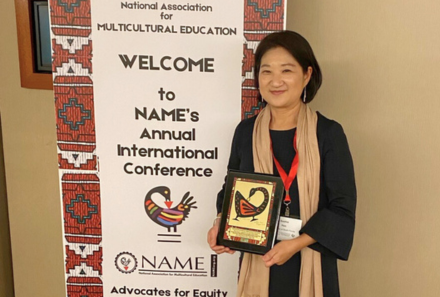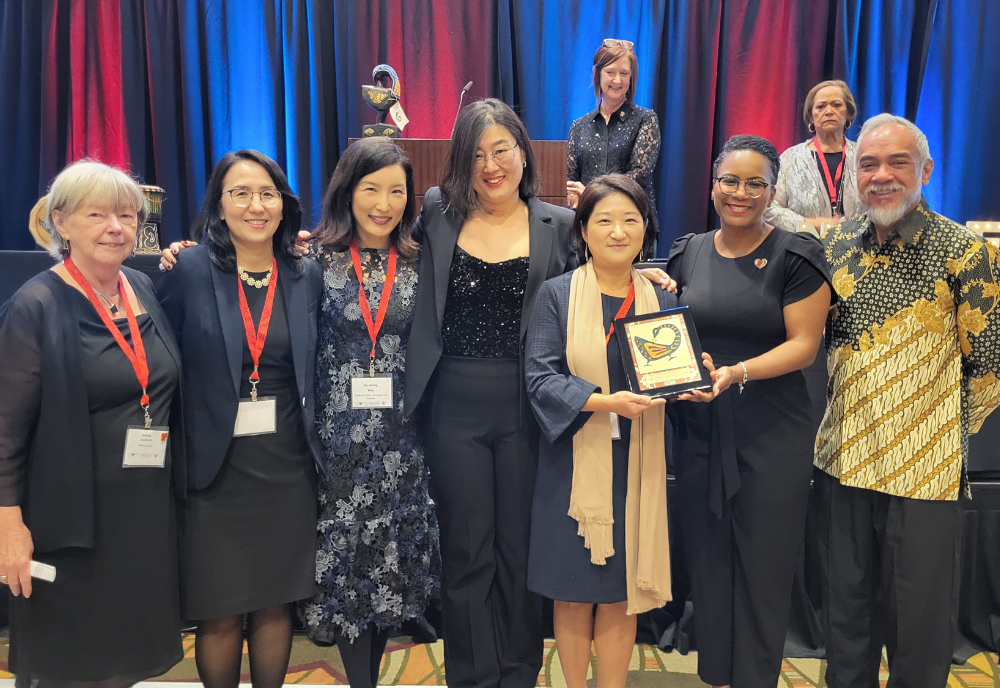Sophia Han, an associate professor at the USF College of Education, has received the 2024 Philip
C. Chinn Multicultural Book Award from the National Association for Multicultural Education (NAME) for her book entitled "Supporting Korean American Children in Early Childhood
Education: Perspectives from Mother-Educators" (2023) published by Teachers College Press. Han was honored at the Awards Banquet during the 2024 Annual NAME International Conference in Anaheim, CA, on November 16.
"This is my first book, so I am deeply humbled and honored to receive this prestigious
award," said Han. "Within the realm of multicultural education in the United States,
Asian American young children have been historically under-appreciated and under-represented.
Hence, receiving this book award indicates that the field of multicultural education
is recognizing its unique contribution."
Founded in 1990, NAME is a leading organization with a mission to advance and advocate
for social justice and educational equity through multicultural education. The Phillip
C. Chinn Multicultural Book Award is given to books that foster awareness, acceptance,
and affirmation of diversity in society and contribute to the development of the multicultural
education field. Han's book was highly applauded for its innovative, culturally responsive,
and sustaining scholarly approach to shed light on young Korean American children
and their families to disrupt and dispel the pervasive stereotypes of Asian Americans.

Sophia Han with her award at the 2024 NAME Annual International Conference.
"I hope this book not only raises awareness of Asian American children in general
but also sheds light on diversity within the group by highlighting Korean American
children and families," said Han. "I also hope this book will inspire educators, researchers,
and policymakers to positively impact U.S. teacher education policy and practice while
forming alliances to make early childhood education more responsive, inclusive, and
equitable for all other minoritized young children and families."
Han engages in advocacy-focused scholarship on how Asian American children and families
are experiencing and navigating social, racial, and cultural climates and how to implement
critical inquiry-oriented and socio-culturally responsive early childhood teacher
education in diverse cultural and global contexts. As a Korean American mother-educator,
Han explained that writing this book was an act of resistance against pervasive marginalization
and stereotypes facing Asian American children.
An aspect of this book that Han is especially proud of is the introduction of Suda.
This traditional Korean dialogic practice serves as a culturally responsive, sustaining,
and decolonizing research methodology. "It helped illuminate vivid experiences and
challenges and highlight diverse strengths and resilience," said Han.
In one of Han's current projects entitled "Resisting Asian American Racism: Empowering
Korean American Families through the F2F (Family-to-Family) Suda Program," she is
applying the Suda framework to support Korean American families by helping their young
children navigate the issues of race, racism, and racial identity development. This
project is funded by the Brady Education Foundation, an organization with a mission to close educational opportunity gaps associated
with race, ethnicity, and family income.
